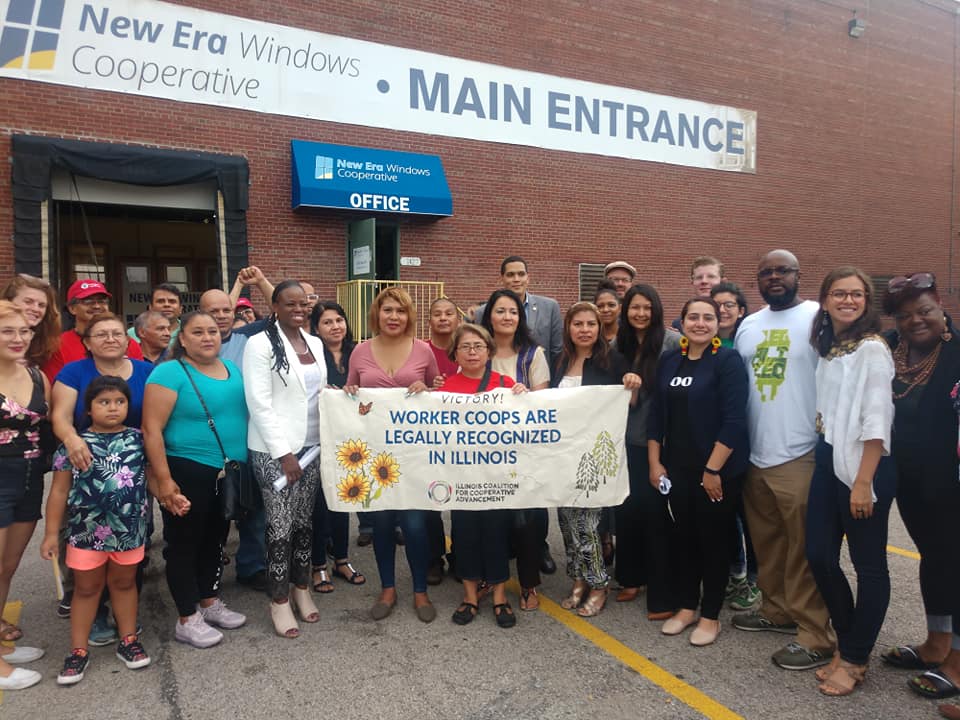New statute will make it easier to launch and grow worker coops
by Karen Kahn

On August 9, Governor J.B. Pritzker of Illinois signed into law the Limited Worker Cooperative Association Act (LWCAA), which provides for a new business entity in the state, a limited worker cooperative association. Similar to statutes in 13 other states, the law:
- Allows for businesses to assert themselves as worker cooperatives under state statute;
- Enshrines cooperative values into the business form;
- Allows cooperatives to raise capital without the burden of costly securities registration; and
- Creates broader access to ownership for low- and moderate-income entrepreneurs, including formerly incarcerated individuals and undocumented immigrants who have some of the greatest challenges finding employment.
The statute, which was sponsored by Representative Carol Ammons and Senator Iris Martinez, “is better suited for worker cooperatives and multi-stakeholder cooperatives,” said Renee Hatcher from John Marshall Law School.
The [cooperative] business model removes barriers for communities of color, especially for undocumented individuals and formerly incarcerated individuals, to participate in dignified work.
— Representative Carol Ammons, chief sponsor of LWCAA
The Illinois Coalition for Cooperative Advancement—a coalition of cooperatives, cooperative developers and other economic justice organizations—came together in January 2019 to lobby for the passage of the act. The coalition believed the new statute would accelerate cooperative development by ensuring that cooperative businesses could benefit from the federal Main Street Employee Ownership Act (MSEOA). Passed in August 2018, the MSEOA offers cooperative businesses opportunities for technical support from Small Business Development Centers and access to loans from the Small Business Administration.
The coalition, which is a testament to the vibrancy of the Illinois cooperative movement, celebrated the victory with a press conference at New Era Windows. New Era Windows became a national sensation in 2008, when the plant owners precipitously closed the business and fired all their workers. The workers refused to leave, eventually acquired the business, and since 2012 have operated successfully as a worker cooperative.
The new statute will accelerate cooperative development by ensuring that cooperative businesses can benefit from the federal Main Street Employee Ownership Act.
Representative Ammons, speaking at the press conference, reminded everyone, “This is cutting-edge legislation that will significantly grow the cooperative movement in Illinois.” She expressed her excitement “to sponsor the bill and be a strong supporter of businesses where workers collectively drive the business plan, share the profits, ownership, creating community wealth.” She went on to explain the importance of the bill to communities of color, noting “the business model removes barriers for communities of color, especially for undocumented individuals and formerly incarcerated individuals, to participate in dignified work.”
In the U.S., 450 worker cooperatives generated $467 million in revenue last year. The success of worker cooperatives in providing employment for marginalized communities is clear in the data: according to the coalition, 66 percent of worker-owners are women, and, over the last ten years, 60 percent of new cooperative worker-owners have been people of color.
Ana Guajardo, executive director Centro de Trabajadores Unidos – United Workers’ Center and one of the lead organizers for passage of the legislation explained why the statute is so important to their organization’s mission of empowering immigrants and refugees:
What we have found is that while we are helping workers stand
up for their rights, they are still in need of living wage jobs. We have seen that the worker cooperative is a proven model for communities of color
to own and grow a business democratically,
generate a healthy income and to learn how to work together.
One of the cooperative businesses Centro de Trabajadores Unidos has supported is Cooperativa Visionarias, a catering business that cooks authentic Mexican food. Worker owner Rosalinda Cerda spoke about the importance of the cooperative for her community:
We formed a cooperative to be able to have high-quality and dignified jobs. . . . Cooperatives improve our quality of life as well as our
local community. Our goal is to transform the economy so
that we have an economy that works for all of us.
Anton Seals, lead steward of Grow Greater Englewood, which supports black-owned farm cooperatives, noted that only 6 percent of Chicago businesses are owned by Latinx entrepreneurs and 2 percent by African Americans. But, he said, “This is about to change. Now that Illinois has the Limited Worker Cooperative Association that recognizes worker coops, we are creating a path for coops to start and thrive.”
Karen Kahn provides communications consulting and editorial support for Fifty by Fifty.
To follow Employee Ownership News, subscribe to the Fifty by Fifty newsletter or follow us at Medium.
